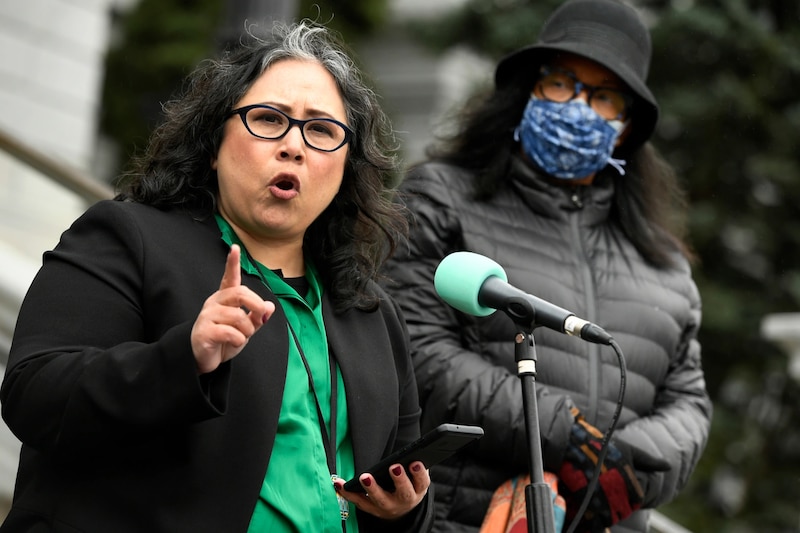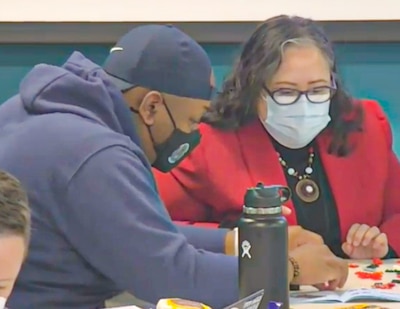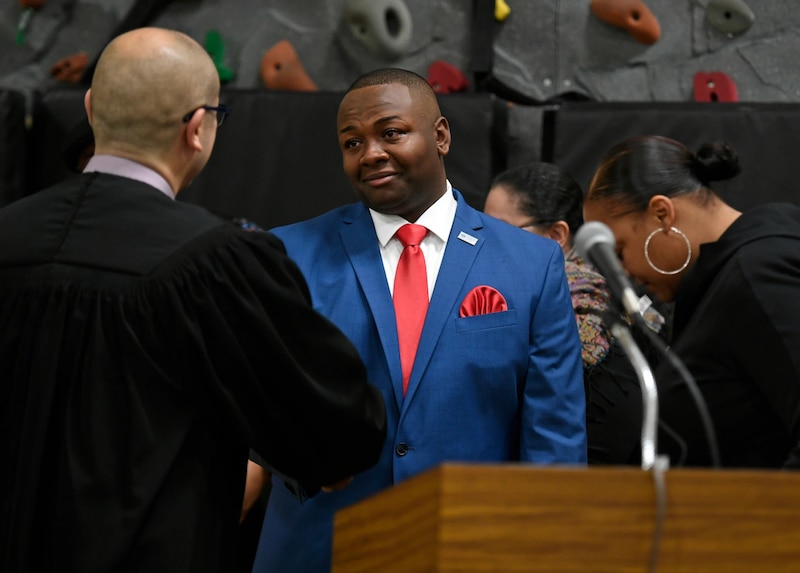Personality conflicts, power struggles, and tense debates have marked the past several months on the Denver school board. The strife is driven less by political differences than by disagreements about how the board should operate. Some community members worry the disagreements are eroding trust in the board and distracting from the goal of advancing equity for students.
The school board’s latest retreat, held in mid-June, was facilitated by a consultant who specializes in conflict resolution. Forty-five minutes into the eight-hour meeting, the facilitator noted the tension in the glass-walled, high-rise meeting room.
“I absolutely feel the energy in this room of mistrust and fear and hesitation,” she said.
The facilitator asked the board to suspend those feelings and imagine what could be possible if all seven of them worked together — an outcome that is all the more crucial as Denver Public Schools heads into a new school year with lots of ground to make up.
“The interpersonal challenges we’re facing right now is something we need to overcome immediately,” board President Xóchitl “Sochi” Gaytán said in an interview, “so we can meet the focus and intent of doing policy work that impacts our students.”
This board was expected to be more unified than any in recent history because all members were backed by the Denver Classroom Teachers Association and pledged a new approach after more than a decade of education reform policies. But over the past six months, board members have interrupted one another in meetings, raised their voices, and accused each other of gaslighting, misogyny, and playing the “oppression Olympics.”
They disagree on matters as small as whether to call each other by their first names in work sessions and as big as how to gather feedback from the community, which has led some members to hold public events without inviting others.
The board spent much of the winter and spring debating a single policy related to school autonomy and teachers rights, which critics said left little time to talk about important issues such as helping students learn to read and improving their mental health.
The tensions boiled over at a June meeting to fill a vacant board seat. It took nine rounds of voting and several heated and emotional exchanges for a majority of members to agree.
“I’ve shared with each of you privately that I’m really worried about the health of our board in moving forward,” member Carrie Olson said at the meeting.
A few days later, Gaytán told local media outlets she feared at-large board members Tay Anderson and Scott Esserman were planning to replace her as president. The fear stemmed partly from comments Anderson made on a local internet talk show about wanting to “decrease and decentralize the role of the president and empower it in the board as a whole.”
A coup didn’t happen. But apprehension and accusations permeated what was supposed to be a meeting to work through differences. When the mediator tried to pair Gaytán and Esserman for an exercise, Gaytán said she didn’t want to be alone in a room with him.
The board headed into summer break with conflicts unresolved.
Differing views of how board should run
Chalkbeat spoke with six of the seven board members, as well as more than a dozen parents, educators, and community members who watch the board closely. Some said adult politics and personalities have gotten in the way of children’s needs.
“I believe each one of our board members is a good person because you don’t volunteer for this job if you don’t care about kids at some level,” said Nicholas Martinez, co-founder of local advocacy group Transform Education Now.
“But I don’t see folks being willing to put their own goals aside to do right by kids.”
Others see passion and a new board finding its way.
“From my perspective, we have a group of passionate leaders that chose to be in service of the students of Denver Public Schools,” said board member Michelle Quattlebaum, who was elected last year. “And so with that passion sometimes you have disagreements.
“As far as us being functional, dysfunctional, something in between, I guess I’d say it’s in between. We’re trying to find our synergy and what does that look like.”
With the exception of the newly appointed member, the board has been working together since November. That’s when three new members — Gaytán, Quattlebaum, and Esserman — were elected. Their first meeting included a surprise: In a secret ballot, Gaytán was chosen as president over Olson, who had led the board for the past two years.

Quattlebaum was elected secretary and Esserman was elected treasurer. Anderson, who joined the board in 2019, was elected vice president.
The vote created a leadership group representative of the board’s diversity. It also elevated brand-new members while the board was transitioning to a new, little understood governance structure that has become its own source of tension.
Called policy governance, it is meant to set clear expectations for the board and superintendent. Board members set goals for the district. The superintendent comes up with a strategic plan to reach those goals. The board then evaluates the superintendent — and decides whether to fire or rehire him — based on the progress he made toward those goals.
The previous board adopted it in the spring of 2021 to help attract a new superintendent. Some in Denver, including the mayor, blamed a dysfunctional school board for the resignation of former Superintendent Susana Cordova in 2020. Board members wanted to assure her successor that they wouldn’t be micromanaged or undermined.
But most board members said the switch to policy governance has been bumpy.
“Part of what’s going on with policy governance is that we have seven board members with seven different understandings of what policy governance should look like and how it should be implemented and how to interpret what it is,” Esserman said.
Pushback on how the president monitors behavior
Current board policy says the president should “monitor board behavior” to make sure members are following rules and policies, as well as state law. But the board is still drafting some of its rules, including around how to engage the community and gather feedback, which has led to disagreements about what members can and can’t do.
Early this year, Anderson, Esserman, and Quattlebaum planned to host a virtual town hall meeting about a proposal introduced by Gaytán and board member Scott Baldermann. The proposal aimed to shore up teacher job protections but also limited the autonomy enjoyed by innovation schools. It was controversial from the start.
Gaytán told the other board members to hold off.
“I am pausing any impending town halls,” she wrote in an email to board members that was obtained by Chalkbeat. She also asked board members to refrain from meeting with teachers or principals “until we implement a plan for our community engagement.” Gaytán has said policy governance requires the board to speak with “one voice” and engage the community together.
In emails, Anderson and Esserman pushed back. Anderson said that while he respected Gaytán as president, he disagreed with her “unilateral” decision to nix the town hall.
“I have always held town halls on significant issues like this without the board president pushing back,” he wrote, adding that he’d followed her directive for 11 days but couldn’t continue to do so when the board was considering voting on the job protections as early as the following month. “I must be accountable to those who sent me to this seat and at least hear them out.”

Anderson, Esserman, and Quattlebaum held the town hall.
How board members interact with the public continues to be a point of contention. Anderson and Esserman are launching a series of community meetings starting Saturday. They didn’t coordinate with Gaytán to plan the session in her own southwest Denver district.
Gaytán also has chided board members about comments they’ve made publicly. For example, she confronted Esserman for saying at a community meeting that a district decision to move a storied JROTC program from Manual High School, where most students are Black and Latino, was an example of institutional racism.
Gaytán summarized her conversation with Esserman in an email that she provided to Denver media outlet Westword. She wrote that his comments at Manual were “egregious” and put the integrity of the board and superintendent at risk.
“Esserman responded with an aggressive tone and was dismissive by telling me that I had limited authority as president of the board,” Gaytán wrote. “He told me that the authority I believed I had was in fact ‘imaginary authority.’ He continued with his verbal abuse and stated that my interpretation of policy governance is a ‘garbage interpretation.’”
In an interview, Esserman declined to comment on allegations that he verbally abused Gaytán.
“I don’t think that it serves the students, families, teachers, and community members of Denver Public Schools to get into that,” he said. “I’m not interested in engaging in that dialogue publicly.”
Gaytán has made similar allegations of bullying against Anderson.
“There are some people who will question a woman leader,” Gaytán said in an interview. “That’s one aspect of what could potentially be some of the dynamics at play here.”
Anderson said his disagreements with Gaytán are because they have different opinions on policy governance and the role of the board president.
“There have been several times where our president has been misguided on her power or her roles and we’ve had to correct that in private settings,” Anderson said. “Any time we push back, we are met with, ‘We are anti-Latino, we are anti-women, we are anti-something.’
“It’s truly just stating, ‘This is the role of the board president.’”

Anderson said he voted for Gaytán for president but now regrets it.
“If I could do it again,” he said, “I would have cast my ballot for President Olson.”
Worries that board division could affect students
Why does it matter if the school board is getting along? In short, community members said, because dysfunction on the board can get in the way of schools making progress for students.
“The power struggle will overshadow the board doing anything,” said Milo Marquez, who belongs to a group called the Latino Education Coalition, which supports Gaytán as president. “It’s taking away from the larger focus, and that is that our children come first.”
TeRay Esquibel, who heads an organization for young Denver Public Schools alumni called Ednium: The Alumni Collective, agreed.
“I hope at some point we can get to a point where we’re having conversations on, ‘What does it mean to serve students and families?’” he said.
Those who helped elect the board members also worry that any dysfunction could be used as political fodder for their opponents. Retired Denver teacher Margaret Bobb runs a popular pro-union Facebook page with more than 5,000 members. She shut it down for the summer because acrimonious comments, especially in the wake of a split vote to appoint new board member Charmaine Lindsay, were raising public awareness of divisions on the board.
“I thought we were all headed in the same positive direction together,” Bobb said of the board members. “I hope they’re using this time in the summer to meet one-on-one with each other and resolve whatever is simmering below the surface.”
After the contentious retreat in June, the board took July off. Their first meeting of the new school year will be another hourslong retreat Aug. 8.
“We’re all committed to the kids,” Olson said. “We have a lot of the right ingredients to make a recipe of a strong board. We’re just not there yet.”
Melanie Asmar is a senior reporter for Chalkbeat Colorado, covering Denver Public Schools. Contact Melanie at masmar@chalkbeat.org.






